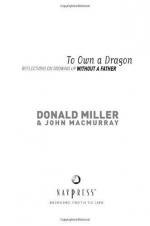
|
| Name: _________________________ | Period: ___________________ |
This test consists of 5 multiple choice questions, 5 short answer questions, and 10 short essay questions.
Multiple Choice Questions
1. MacMurray criticizes which parts of Miller's work ethic?
(a) His laziness.
(b) His sleep and work habits.
(c) Miller has no problems with his work ethics.
(d) His getting to lwork late.
2. Where does Miller first realize he needs to achieve manhood?
(a) Miller believes he has already achieved manhood.
(b) At a rally for Christian men.
(c) When he falls in love.
(d) Miller does not believe that men need to achieve manhood.
3. Which of the following is an important characteristic of becoming a man, according to Miller?
(a) Making good decisions and taking responsiblity for one's decisions.
(b) Making mistakes and learning from these mistakes.
(c) Time and life experiences.
(d) Believing in God and attending church.
4. In Chapter 12 on work ethics, Miller uses a story about children to illustrate his point. What does he learn about children?
(a) Children are to be seen and not heard.
(b) Children are a blessing.
(c) Children wake early and wake everyone up.
(d) Chldren are loud and noisy.
5. Who tells Miller about real love in Chapter 9?
(a) Dr. Kinsey.
(b) Miller's mother.
(c) A married friend.
(d) No one.
Short Answer Questions
1. Why does Miller believe he knows very little about girls?
2. Who should man work to please, according to MacMurray?
3. Which of MacMurray's children gets Miller out of bed by begging to be carried down the stairs?
4. What class does Miller want to take in high school that he is not eligible for?
5. One of Miller's friends tells Miller about real love. What does Miller's friends state is a core characteristic of real love?
Short Essay Questions
1. In Chapter 9, Girls, Miller tells the story of a young woman in a coffee shop. Why does he tell this story?
2. In Chapter 10, Why does Miller promote maturity for young men?
3. As an adult, Miller often found himself having difficulty fitting in with the men in his church and life, particularly in his Bible study class. What did he think the problem was?
4. Miller learns to play chess from a friend. He also tells a story about a man, Salome Thomas-El teaching boys from a ghetto to play chess. He sees a connection between playing chess and life for young men raised without fathers. What is this connection?
5. Many people, including the famous Dr. Alfred Kinsey, have researched sex. What have we learned from these sex researchers?
6. In Chapter 9, why does Miller say that he dated?
7. In Chapter 7, Manhood, Miller attends a Promise Keepers rally and then joins the organization. However, he struggles with this membership. Why did he join and what were his struggles?
8. In Chapter 11, what does the author tell us that he believes about college?
9. Chapter 7 is the last chapter in which Miller talks extensively about his mother. How does his thinking about his mother change from the beginning of this book to this chapter?
10. Miller assumes that humans have to work because God is punishing the sinful nature of humanity. MacMurray disagrees. How does MacMurray explain humanity's need to work?
|
This section contains 1,258 words (approx. 5 pages at 300 words per page) |

|




